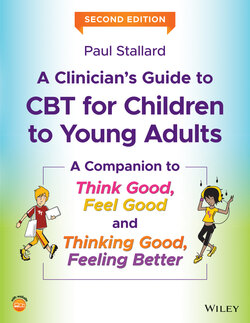Читать книгу A Clinician's Guide to CBT for Children to Young Adults - Paul Stallard - Страница 26
Empowering
ОглавлениеThe final pillar of the CORE philosophy is that of empowerment, a process which helps the young person to become stronger and more confident, to discover what works for them, and to explore and develop solutions to their problems. Empowerment therefore increases understanding and helps the young person to recognise their skills and strengths and their ability to positively influence their well‐being. In effect, the young person is empowered to become their own therapist and to draw on their strengths and ideas to overcome their difficulties.
Empowerment is a strengths‐based, positive approach that involves the enhancement of three inter‐related processes. The first, self‐awareness, helps the young person to understand themselves, their values, their strengths, the way they think, and how they feel and behave. Through the development of self‐awareness, young people are better equipped to identify and positively respond to potential problems at an early stage. Self‐awareness is promoted through an educative process where the young person acquires new knowledge, insights, and meanings. The development of the formulation, for example, is an educative process where thoughts, feelings, and behaviours are brought together in a coherent way that helps the young person to make sense of their experiences. The young person is the ‘expert’ of their own experiences, with the clinician providing the framework within which these experiences can be organised. Understanding the relationship between the key elements of the CBT model helps the young person to discover how their current problems have developed and how they are being maintained. Once understood, the formulation can be used by the young person as a structure for thinking about what needs to change to break out of this unhelpful cycle. The young person is empowered to consider whether they might need to change their relationship with their thoughts, how they can manage or tolerate unpleasant feelings, or how they could behave in different ways.
The second process, self‐efficacy, relates to how effectively young people use their skills, strengths, and personal resources to positively secure their goals and resolve their difficulties. The CORE philosophy aims to strengthen self‐efficacy and the belief that the young person has strengths and skills that can be positively used to improve their well‐being. Enhancing self‐efficacy can be motivating and empower greater engagement. A key aspect of self‐efficacy is the accurate recognition of one’s own strengths, skills, and abilities. The Socratic process can help young people attend to situations where they have coped/ been successful and identify what they did on those occasions that was helpful. Self‐efficacy can be developed by inviting the young person to consider how these skills could be used in other situations or to help with other problems. Similarly, self‐monitoring provides useful feedback about helpful skills and strategies that may already be within the young person’s repertoire. Highlighting these can strengthen the young person’s beliefs that they can overcome their problems and do something to improve their well‐being.
Finally, self‐control is the ability to regulate behaviour, emotions, and thoughts. Through CBT, the young person develops effective self‐management skills which help them to feel more confident, in control, and able to deal with future challenges. This concept of self‐control is promoted throughout CBT through the development of skills. Active skills can include the development of emotional management techniques or thought challenging that promote greater control by actively attempting to challenge and change distressing emotions or thoughts. Behavioural experiments provide a way of developing and demonstrating self‐control through the practice of new skills. Finally, self‐control can be promoted using mindfulness, distress tolerance, acceptance, and compassion‐based skills. Rather than actively attempting to change feelings or thoughts, a sense of self‐control can be promoted by learning to accept what is occurring.
In summary, empowerment promotes increased knowledge, recognition of strengths and skills, and enhanced perceptions of self‐efficacy and self‐control. The CORE philosophy is therefore positive and empowering, designed to motivate the young person to use their strengths and skills to maintain their well‐being and to deal with future challenges.
